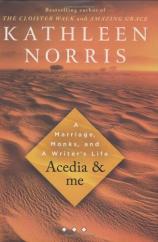Acedia & Me: A Marriage, Monks, and a Writer’s Life
Review
Acedia & Me: A Marriage, Monks, and a Writer’s Life
In ACEDIA & ME, bestselling author Kathleen Norris (DAKOTA, THE CLOISTER WALK) brings her quiet wisdom to the age-old problem of being unable to fully engage with life and illuminates it for a contemporary audience. She also vulnerably traces her journey with the condition and that of her late husband, David, as well as explaining the history of acedia in literature and the church, and in light of theology and psychology.
Readers may be unfamiliar with acedia except in general terms, and Norris notes that the term has largely fallen out of usage over the past 1,600 years. The dictionary defines acedia as spiritual or mental sloth, a state of listlessness; apathy, showing no interest, concern or enthusiasm. Or, as some name it, despair (but not to be confused with depression). Acedia was known as “the noonday demon” in early church history, when it was more prominently discussed. Although not one of the seven deadly sins, acedia is seen as “the eighth bad thought” or a precursor to sloth. It is, Norris says, difficult to see acedia at work in our lives. It requires discernment.
Throughout the book, which reads like a collection of mini-essays (that sometimes lack cohesion), Norris braids together stories about her childhood, marriage, monasticism (she is an oblate) and the writing life. She also shares about her marriage of 30 years, sometimes in passing, other times at length. She tells us what acedia is (“our inability to get along with ourselves, our disunion with God”) and what it is not (the classic “dark night of the soul.”)
Acedia keeps us from fully loving and thoroughly engaging with the world, and living a life as rich as possible, and may not look like “laziness.” In fact, it might look like the opposite. For Norris, experience with acedia “first came to me on the proving ground of adolescence, becoming my unknown and unnamed companion. To defeat it, I learned to keep busy.” She cultivated what she calls a studied aloofness, “not realizing that a refusal to suffer pain is also a refusal to love.”
Of acedia’s modern-day manifestation, she writes: “…As we languish from spiritual drought, we are often unaware of what ails us. We spend greater sums on leisure but are more tense than ever, and hire lifestyle coaches to ease the stress. We turn away from the daily news, complaining of “compassion fatigue,” and enroll in classes to learn how to breathe and relax. Increasingly, we need drugs in order to sleep. We are tempted to regard with reverence those dedicated souls who make themselves available ‘twenty-four/seven’ and regard silence as unproductive, solitude as irresponsible.”
As Norris looks back on her life, she writes that she now realizes acedia influenced many of her life decisions, including not having children. Acedia --- and its close companion, depression --- also affected her marriage. One of the most poignant personal narratives of the book comes early, when Norris tells of how her husband, David, falls into a severe episode of acedia and depression and is hospitalized in a psychiatric ward after leaving a suicide note. She discovers he has let their medical insurance lapse: “He had been trying to mess things up so badly that they couldn’t be fixed and I would reject him.” Their phone is turned off, her computer goes on the fritz: “Everything was breaking down; first my husband, then the phone, and now the damn computer.” It’s narratives like this one that add richness to the historical and psychological insights.
Once acedia is understood, it must be tamed or at least wrestled with. Norris shares her acedia toolbox, ways she and others throughout history have coped. “For me, a measure of healing has come less from psychology than from religion, specifically the ancient practices of prayer and psalmody. Once when I was all but paralyzed by despair, a wise physician prescribed physical exercise and spiritual direction. It worked.” The early church fathers, who she quotes prodigiously, offer many ideas sprinkled throughout the book, such as endurance, manual labor, fervent prayer and coping one day at a time. She notes that Thomas Aquinas recommended a hot bath, a glass of wine and a good night’s sleep.
Norris’s wisdom on acedia is well worth mining for contemporary readers who know little about it but want to understand the condition, or for those who realize they suffer from acedia but are unsure what to do next. Modern-day readers will learn how to name it and, in knowing it, be better able to cope with this mystifying malady that leaves us listless, uncaring and unable to embrace life to the fullest.
Reviewed by Cindy Crosby on September 16, 2008
Acedia & Me: A Marriage, Monks, and a Writer’s Life
- Publication Date: September 16, 2008
- Genres: Christian
- Hardcover: 352 pages
- Publisher: Riverhead Hardcover
- ISBN-10: 1594489963
- ISBN-13: 9781594489969




